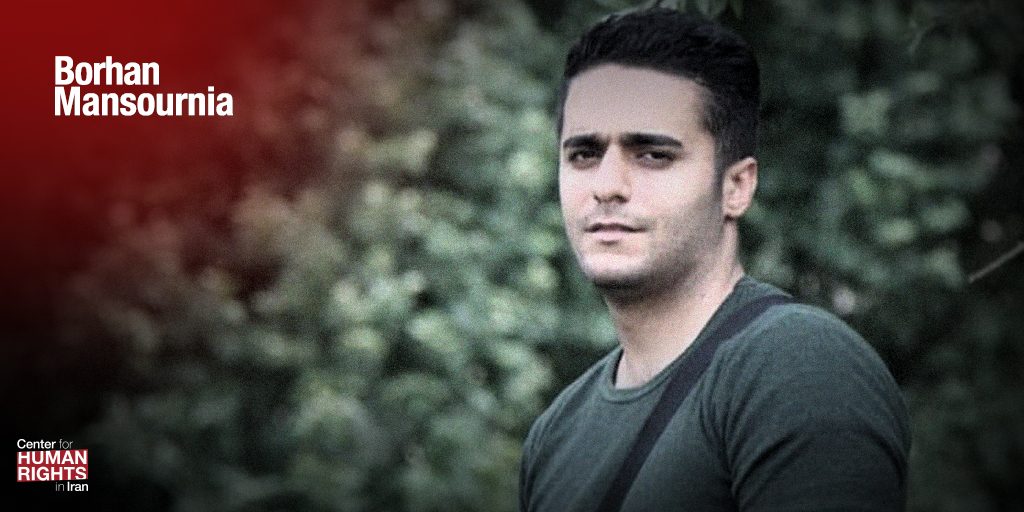Slain Protester’s Family Refuses to Give Iranian Government “Propaganda Coup”
 Iranian authorities are continuing to pressure the family of Borhan Mansournia, who died from a bullet wound in the back when state forces violently cracked down on the street protest he had joined, to accept their offer to declare Mansournia a “martyr,” one of his relatives told the Center for Human Rights in Iran (CHRI).
Iranian authorities are continuing to pressure the family of Borhan Mansournia, who died from a bullet wound in the back when state forces violently cracked down on the street protest he had joined, to accept their offer to declare Mansournia a “martyr,” one of his relatives told the Center for Human Rights in Iran (CHRI).
But accepting the offer “would be an important propaganda coup for the state,” according to the relative who requested anonymity for fear of reprisals for speaking openly about the issue.
“They say they have done all the paperwork for his designation as a martyr,” added the relative. “But what they haven’t said is why they killed Borhan. They haven’t named the killer or killers.” (Scroll down for a complete interview transcript below).
The relative also said that Mansournia told his family what happened before he died: “Borhan was one of the few people who lived to tell his story. He lived for a day after he was shot and during that time he was able to describe everything to his family.”
Martyr or Victim Who Was Denied Justice?
An official designation that the Iranian government applies to those whom it has categorized as having willingly given their lives for the Islamic Republic or Islam, martyrs are memorialized and granted access to special state services and benefits.
On December 4, Supreme Leader Ali Khamenei issued an order declaring all “ordinary citizens with no role in the recent protests and riots who died in the clashes” should be treated as martyrs.
His statement was carefully worded to delegitimize the protests that exploded in dozens of Iranian cities between November to December 2019 as well as the calls and concerns of those who attended them.
At least 304 people (some sources report significantly higher numbers) were killed throughout Iran during that time, according to Amnesty International, when state forces waged a violent crackdown on street demonstrations that were initially ignited by the government’s announcement that it would be increasing the price of gasoline.
To date, the government of President Hassan Rouhani has refused to provide an official number of how many people were killed and injured in the crackdown, or hold anyone accountable for the deaths of protesters and bystanders.
Several rights organization including CHRI have expressed serious concerns that those who were detained in the state crackdown and remain detained to this day could be tortured and/or be denied access to counsel and due process.
Several victims’ families including Mansournia’s have meanwhile reported being pressured to echo the government’s line on the protests or not speak about them all.
Shortly before dying from a gunshot wound in his back in Kermanshah, western Iran, on November 16, 2019, the 28-year-old military conscript had achieved a degree in veterinary medicine. He was buried near his home in Marivan, Kurdistan Province. The following statements by a member of the Mansournia family were provided to CHRI in January 2020.
Transcript of Relative’s Statements to CHRI
In the beginning there was pressure on the family not to say anything to the media about Borhan. Now the pressures have increased very much and the authorities—everyone from the Friday prayer leader of Marivan to the governor and the representative of the Islamic Revolutionary Guard Corps’ intelligence organization—want to come and visit the family. But so far they have refused.
The authorities want to come with cameras and reporters to create propaganda and declare Borhan a martyr. They say they have done all the paperwork for his designation as a martyr. But what they haven’t said is why they killed Borhan. They haven’t named the killer or killers.
The family of another person who was killed in the Marivan protests were in dire need of financial help because they had lost their breadwinner. They wanted him to be declared a martyr, but the authorities haven’t responded to their request.
This seems to show that the authorities are only focusing on those victims whose deaths have been reported in the media. They want to claim them as state martyrs. On the other hand, Borhan was a soldier doing his compulsory military service. Declaring him a martyr would be an important propaganda coup for the state. That’s why his family is under so much pressure.
Borhan was one of the few people who lived to tell his story. He lived for a day after he was shot and during that time he was able to describe everything to his family. Members of his family have been intimidated into silence, but his friends and relatives have revealed everything to the media.
Read this article in Persian.






